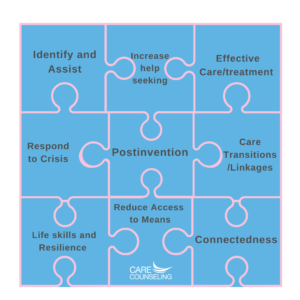A Comprehensive Approach to Suicide Prevention
 A comprehensive approach to Suicide Prevention, provided by the Suicide Prevention and Resource Center (SPRC) offers a model of nine different strategies for suicide prevention, with various activities within each strategy. Let’s look at some of the action steps that can be taken to work together for suicide prevention.
A comprehensive approach to Suicide Prevention, provided by the Suicide Prevention and Resource Center (SPRC) offers a model of nine different strategies for suicide prevention, with various activities within each strategy. Let’s look at some of the action steps that can be taken to work together for suicide prevention.
Identify and Assist
It is important to be aware of behaviors that could indicate being at risk for suicide, especially if these behaviors are new or increased, or occur in response to a significant stressful or traumatic event. This can include talking about feeling like a burden, feeling trapped, experiencing suicidal thoughts, feeling of hopelessness, or looking for an escape from pain which are all warning signs for suicide. Increased substance use may be present as well as increased irritability, mood swings, or reckless behavior. Changes in sleep, appetite, and activity levels may also be present as well as social withdrawal.
Suicide is a serious but preventable mental health problem. Thankfully, mental health screening and educational supports are available. It is important to have regular screening for depression and suicide. At CARE Counseling, depression screening is completed as part of the intake process.
Increase Help-Seeking
This includes helping individuals recognize when they need support and providing the encouragement and support to do so. Normalizing therapy and sharing that you have sought therapy or currently see a therapist can help empower others to receive the care they need.
Effective Care/ Treatment
Access to effective, quality and timely services is key. There are crisis and suicide hotline resources for immediate 24/7 support, as well as mental health treatment at various levels of care including preventative and outpatient mental health care, intensive outpatient, day treatment, and residential programming. At CARE Counseling, we are experts in outpatient mental health care, including depression, burnout, sleep problems, substance use, and anxiety with same-week availability to ensure timely care.
Care Transitions/ Linkages
Incorporating care coordination among family support and providers helps provide continuity of care. This may include stepping up to a higher level such as weekly therapy and increasing frequency or the reverse when first seeking crisis support and stepping down to a lower level of care.
Response to Crisis
Teams of people who work within setting such as schools, organizations, and communities are vital to crisis response. This includes crisis response teams and stabilization programs, suicide hotlines, peer-support programs, and psychiatric emergency response services.
Postvention
This includes strategies to help organizations or communities respond to deaths by suicide by including compassionate support for those directly impacted and working to reduce risks to others who are vulnerable. Reviewing guidelines for how to provide for immediate and long-term postvention are available.
Reduce Access to Means
Reducing access to means is an important step in suicide prevention since having a plan, having means, and intent are significant risk factors. Reducing access to means can include education about safely storing items such as medication and firearms and removing access to unsafe items.
Life Skills and Resilience
Having a good foundation of skills such as interpersonal communication, emotional regulation, stress management, and self-advocacy skills can increase resilience when coping when adversities. These are common skills that many individuals work on in therapy and can directly help reduce vulnerabilities and aid in suicide prevention.
Connectedness
Finally, having a sense of connectedness is needed to help protect individuals who are at risk of suicide. Family, friendships, colleagues, neighbors, social, community supports, healthcare/ therapy and religious or spiritual communities, and social networks including online supports are all important to social connectedness.
Written By: Charlotte Johnson, MA, LPCC


























